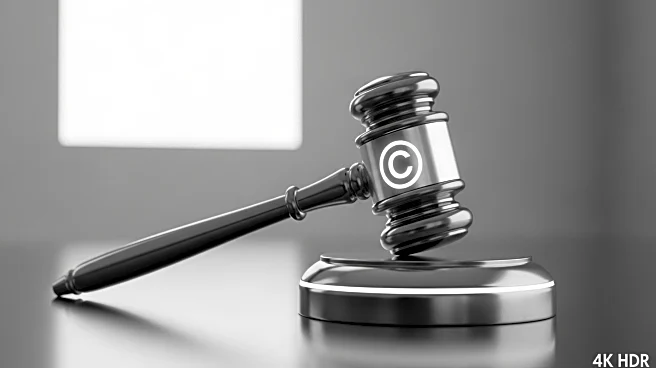What's Happening?
Warner Bros. Discovery has initiated a copyright infringement lawsuit against Midjourney, an AI image and video company. The lawsuit claims that Midjourney has violated Warner Bros.' copyright protections by allowing users to generate images featuring characters such as Batman, Scooby Doo, and Bugs Bunny. This legal action follows similar lawsuits filed by Disney and Universal earlier this year. Warner Bros. argues that Midjourney knowingly infringed on copyrights, citing the company's temporary restrictions on animating scenes with copyrighted characters as evidence of awareness of wrongdoing. The lawsuit also highlights Midjourney's update to its terms of service, which allegedly removed protections for copyright owners.
Why It's Important?
The lawsuit underscores the growing tension between traditional entertainment companies and AI technology firms over copyright issues. As AI tools become more prevalent, the ability to generate content that may infringe on existing copyrights poses significant challenges for content creators and copyright holders. This legal battle could set precedents for how AI companies must navigate copyright laws, potentially impacting the operations of AI firms and their users. The outcome of this case may influence future legal frameworks and protections for intellectual property in the digital age, affecting stakeholders across the entertainment and technology industries.
What's Next?
The lawsuit is in its early stages, and Midjourney users are not expected to experience service interruptions due to the legal proceedings. However, the case could lead to changes in how AI companies manage copyrighted content and enforce restrictions. The legal community and industry stakeholders will be closely monitoring the case for developments that could impact AI content creation and copyright enforcement. As the lawsuit progresses, it may prompt discussions on the need for clearer guidelines and regulations regarding AI-generated content and intellectual property rights.
Beyond the Headlines
This lawsuit highlights broader ethical and legal questions surrounding AI technology and copyright infringement. The ability of AI to replicate and generate content raises concerns about the protection of creative works and the rights of original creators. The case may prompt a reevaluation of existing copyright laws and their applicability to AI-generated content, potentially leading to new legal standards and practices. Additionally, the lawsuit could influence public perception of AI technology and its role in creative industries, sparking debates on the balance between innovation and intellectual property rights.










